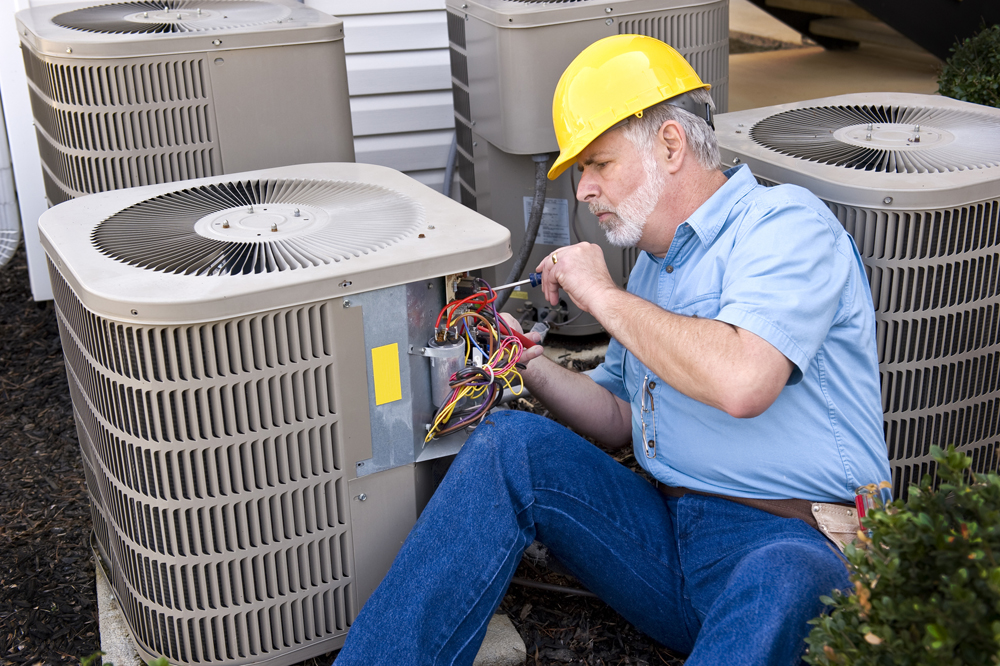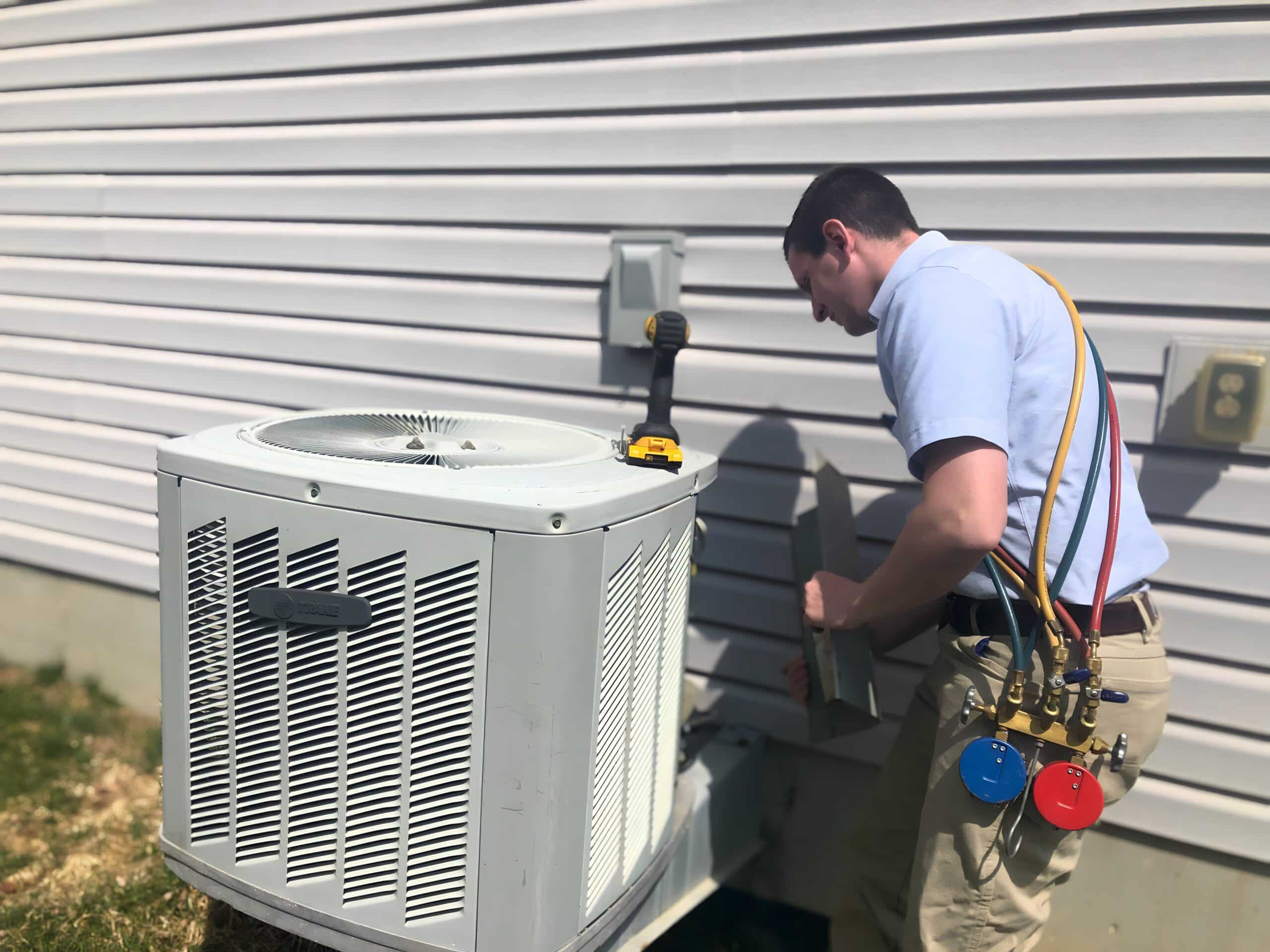Selecting In Between a Heatpump and Furnace: Trick Considerations for Your HVAC Needs
When reviewing home heating alternatives for heating and cooling needs, the decision in between a warm pump and a furnace can be intricate. Each system uses distinct benefits tailored to certain environments and power efficiency goals. Recognizing these distinctions is vital for making an informed choice. Secret variables such as installment prices and environmental effect better make complex the option procedure. Which choice absolutely straightens with one's comfort and sustainability choices? The complying with sections will certainly discover these considerations thoroughly.
Understanding Heat Pumps: Just How They Work and Their Advantages
While numerous homeowners think about various heating alternatives, recognizing how heatpump function and their benefits can significantly influence their choice. Heatpump operate by moving warm instead than producing it. In the winter months, they remove heat from the outdoors air or ground and transfer it indoors, while in the summer, they reverse this procedure, cooling the home by expelling warm outside. This twin functionality makes them flexible for year-round environment control.One of the key advantages of heat pumps is their energy effectiveness. They use significantly less power compared to traditional furnace, possibly leading to reduced energy expenses (furnace replacement). Furthermore, heatpump have a smaller carbon impact, making them an ecologically friendly option. They also call for much less maintenance than traditional systems, adding to lasting expense financial savings. In general, recognizing the technicians and benefits of heat pumps can help home owners make notified decisions concerning their heating and cooling down requirements
Checking Out Furnaces: Types, Procedure, and Advantages
Heaters come in numerous kinds, including gas, electrical, and oil designs, each with distinct functional devices. Recognizing these differences is essential, as they influence efficiency and heating performance. Additionally, heaters provide many advantages, such as consistent warmth outcome and reliability in cooler climates.
Kinds of Heating systems
Heating unit can vary considerably in design and procedure, with heaters being a popular choice amongst homeowners. There are numerous kinds of heating systems, each making use of different gas resources and innovations. Gas heaters prevail, leveraging gas to generate warmth effectively. Electric furnaces, on the other hand, utilize electric resistance to generate heat, often favored for their straightforward installment. Oil furnaces, while much less typical, are reliable in locations with minimal gas access (heat pump service). Furthermore, condensing heaters optimize power effectiveness by capturing and reusing exhaust gases. Each type operates with a system of warm exchangers and ductwork to disperse cozy air throughout a home. Recognizing the differences in between these furnace kinds is important for educated cooling and heating decisions
Benefits of Heaters
For homeowners seeking dependable heat during cold months, the benefits of heating systems are significant. Heaters give regular home heating, making sure even temperatures throughout the home. They are especially effective in extreme cool, typically outperforming heatpump in frigid conditions. Numerous kinds, consisting of gas, electric, and oil heaters, offer adaptability to meet diverse needs and preferences.Furnaces additionally have a tendency to have lower preliminary setup expenses compared to heatpump, making them an extra obtainable option for several. Their robust design contributes to a much longer life expectancy, with numerous systems lasting over 15 years with appropriate upkeep. Furthermore, contemporary heating systems are commonly outfitted with sophisticated technology for enhanced efficiency, which can cause reduced power expenses. On the whole, heating systems remain a dependable selection for reliable home heating.

Power Performance: Contrasting Warmth Pumps and Furnaces
When contrasting energy efficiency in between heatpump and heating systems, the Seasonal Power Effectiveness Proportion (SEER) plays a vital role in establishing performance. Additionally, an operational price evaluation reveals the long-term financial effects of each system. Comprehending these aspects can guide property owners in making notified decisions regarding their heating options.
Seasonal Power Efficiency Ratio
Energy effectiveness plays a necessary duty in the decision-making procedure in between heatpump and furnaces, particularly when considering the Seasonal Energy Efficiency Ratio (SEER) This metric steps the cooling effectiveness of warmth pumps over an entire air conditioning season, giving a standardized means to assess efficiency. Higher SEER rankings suggest higher power effectiveness, equating to lower power intake and lowered energy expenses. On the other hand, furnaces are generally evaluated using the Annual Fuel Use Effectiveness (AFUE) rating, which shows heating performance. When contrasting these two systems, property owners ought to prioritize SEER rankings for heatpump, as they directly influence total energy savings and ecological sustainability. A detailed understanding of SEER can especially influence the long-term satisfaction and cost-effectiveness of the chosen HVAC remedy.
Functional Cost Evaluation
Comprehending the operational expenses connected with warm pumps and heaters is important for homeowners examining their alternatives. Warmth pumps generally use greater power performance, transforming electric power into warm with minimal waste. This causes lower regular monthly utility expenses, specifically in moderate environments. Conversely, typical heating systems, specifically gas models, may have lower in advance costs yet can incur higher functional expenses gradually as a result of sustain costs and effectiveness ratings.Moreover, heatpump can work as both heating and cooling down systems, potentially minimizing the need for separate cooling and heating units. While preliminary financial investments for heat pump service heat pumps may be higher, their long-lasting financial savings in energy efficiency can make them a much more cost-efficient option for several houses. Cautious analysis of local energy prices is vital to determine the very best option.
Setup Expenses: What to Anticipate for each and every Furnace
Installment prices for heating unit can vary considerably between heatpump and heating systems, influencing house owners' choices. Warmth pumps usually have greater in advance installation costs, typically varying from $3,500 to $8,000, check my site depending upon the system size and complexity of setup. This includes the outdoor unit, indoor handling system, and necessary ductwork modifications. Conversely, heaters often tend to have reduced preliminary expenses, averaging between $2,500 and $6,000, which can be appealing for budget-conscious homeowners. Installation costs can raise if extensive ductwork is required.Moreover, the selection of gas type for heaters-- all-natural gas, lp, or electrical-- can likewise impact installment expenses. While heatpump offer power effectiveness, their initial financial investment might deter some purchasers. Eventually, evaluating installation expenses along with long-term cost savings and efficiency will certainly assist property owners in making notified decisions regarding their furnace.
Environment Considerations: Which System Does Better in Your Location
How do environment conditions affect the effectiveness of heating unit? The performance of heatpump and furnaces can differ significantly depending on the regional environment. In moderate climates, heatpump stand out by efficiently moving warm from the outside air, making them an energy-saving choice. However, their performance diminishes in very cool temperatures, where they might battle to extract adequate warmth. Conversely, heating systems, specifically gas models, offer constant and reliable heat no matter exterior conditions, making them preferable in cooler regions.In locations that experience milder wintertimes, warm pumps can run successfully year-round, supplying both heating & cooling. In comparison, areas with rough winters frequently gain from the toughness of furnaces. Inevitably, understanding the local climate is crucial when choosing in between a heat pump and a heating system, as it directly impacts their functional performance and overall performance.
Maintenance Needs: Long-Term Look After Warm Pumps vs. Furnaces
While both warmth pumps and furnaces require normal maintenance to guarantee peak efficiency, their particular needs and treatment routines vary significantly. Furnaces typically require less constant attention, with yearly assessments sufficing to look for gas leakages, tidy filters, and examine overall capability. Their simpler layout commonly allows for simple repairs.In contrast, heatpump necessitate biannual upkeep due to their dual duty in heating and cooling. This consists of cleaning coils, examining refrigerant degrees, and making certain that both the interior and outside systems work at their finest. Furthermore, warmth pump maintenance often includes even more intricate elements, making specialist maintenance essential.Neglecting maintenance can cause lessened efficiency and boosted power costs for both systems. Eventually, home owners should think about these lasting treatment demands when choosing between a warm pump and a heating system, as aggressive maintenance can extend the life expectancy and efficiency of either system substantially.
Ecological Impact: Choosing a Sustainable Heating Choice
The view website environmental effect of home heating systems is an essential assessment for house owners looking for lasting choices. Heat pumps are typically much more energy-efficient than conventional furnaces, as they move heat instead than generate it, significantly reducing carbon discharges. By making use of eco-friendly energy resources, such as air-source or geothermal warmth pumps, homeowners can further reduce their ecological footprint.On the other hand, natural gas heaters emit greenhouse gases and contribute to air contamination, though they usually give greater warm output. However, advancements in modern technology have actually caused the advancement of high-efficiency furnaces that minimize emissions.Ultimately, picking a heater includes weighing performance against ecological influence. Property owners are urged to assess local power resources and motivations for eco-friendly systems, ensuring a choice that straightens with both individual comfort and environmental responsibility. The choice impacts not only immediate convenience but also long-lasting sustainability and environmental wellness.
Frequently Asked Inquiries
How Lengthy Do Heat Pumps and Furnaces Commonly Last?
The life expectancy of warmth pumps normally varies from 15 to twenty years, while heaters can last between 15 to thirty years. Normal upkeep significantly influences their longevity and effectiveness in giving heating options.
Can I Make Use Of a Heatpump in Very Cold Climates?
Heatpump can operate in incredibly cool environments, but their effectiveness lessens as temperatures drop. In such conditions, extra home heating sources may be needed to keep comfy interior temperatures and guarantee peak performance.

What Is the Noise Degree of Warmth Pumps Versus Furnaces?
The sound degrees of heatpump and furnaces differ considerably. Generally, warm pumps run more silently than typical heating systems, making them more suitable for those conscious seem, while furnaces might produce louder functional noises throughout heating cycles.
Are Warmth Pumps Suitable for Both Heating & Cooling?
Heatpump are indeed appropriate for both heating and air conditioning (ductless mini splits). They function by moving warm, providing effective temperature control year-round, making them a versatile selection for home owners looking for an all-in-one heating and cooling remedy
What Size Home Heating System Do I Required for My Home?
Identifying the ideal size heating unit for a home requires reviewing elements such as square video footage, insulation quality, regional environment, and the home's format. Consulting a professional can ensure an exact assessment and optimal comfort. Warmth pumps usually offer higher energy performance, converting electrical power right into heat with very little waste. In modest environments, warm pumps succeed by efficiently transferring heat from the outdoors air, making them an energy-saving alternative. Conversely, heating systems, specifically gas versions, provide trustworthy and consistent heat regardless of outside problems, making them better in cooler regions.In locations that experience milder winters, heat pumps can operate efficiently year-round, supplying both heating and cooling. Warm pumps are normally a lot more energy-efficient than standard heaters, as they move warmth instead than produce it, considerably minimizing carbon discharges. By using sustainable energy sources, such as geothermal or air-source heat pumps, homeowners can further lessen their ecological footprint.On the various other hand, all-natural gas heating systems discharge greenhouse gases and add to air pollution, though they typically offer higher warm outcome.